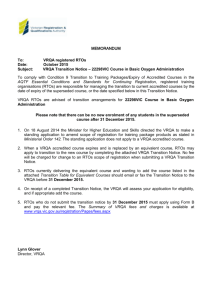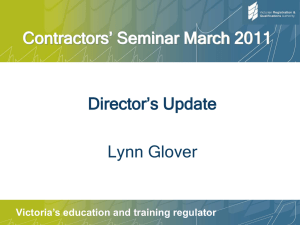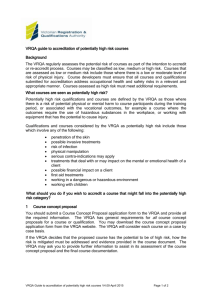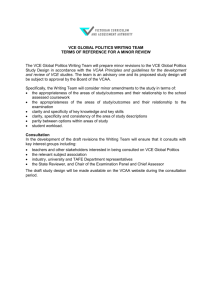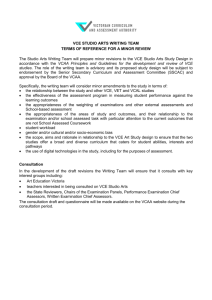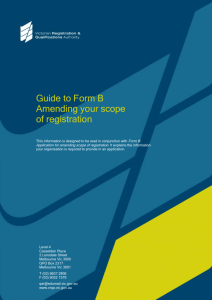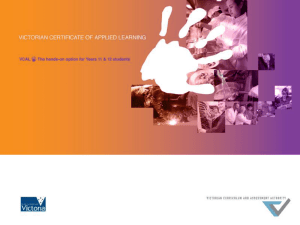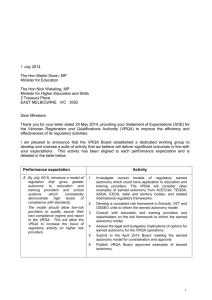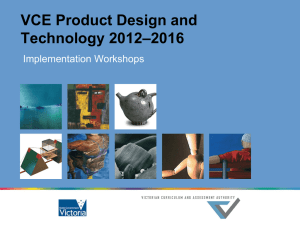registration-senior secondary course guide
advertisement
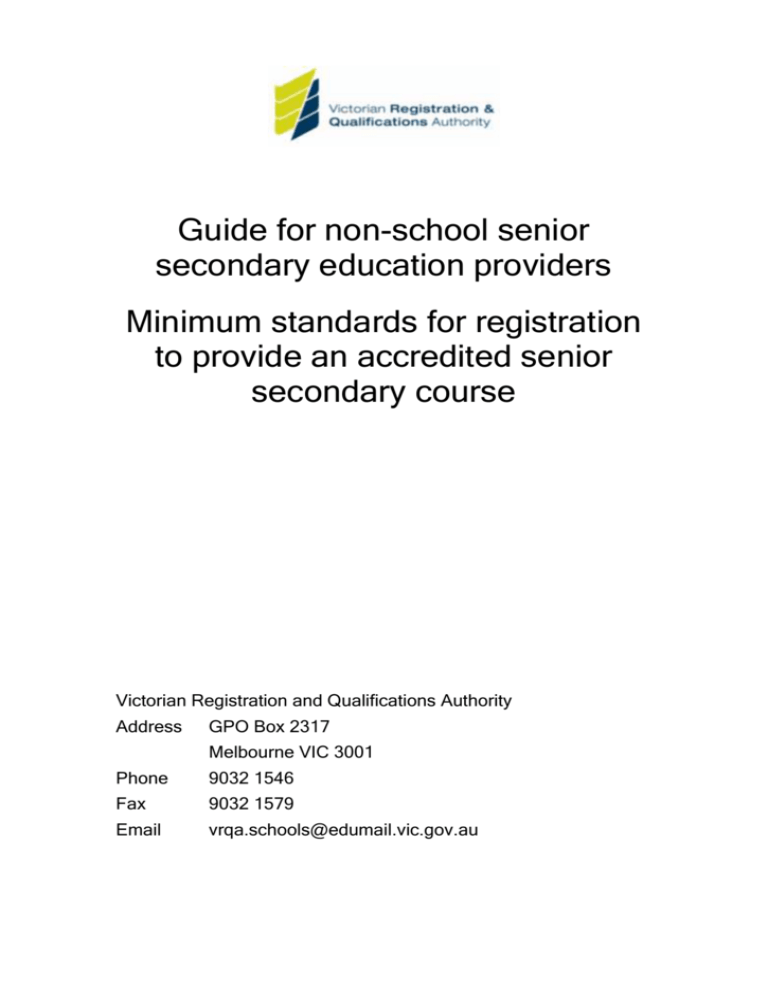
Guide for non-school senior secondary education providers Minimum standards for registration to provide an accredited senior secondary course Victorian Registration and Qualifications Authority Address GPO Box 2317 Melbourne VIC 3001 Phone 9032 1546 Fax 9032 1579 Email vrqa.schools@edumail.vic.gov.au Contents Introduction The Education and Training Reform Act 2006 1 Registration of education and training providers 1 Registration process Requirement for registration 2 Requirement to comply with the minimum standards 2 Steps in the registration process 2 1. Collect information 2 2. Evidence of compliance 2 3. Submit application 2 4. Registration decision 3 Adding additional courses to the register 3 Review of compliance 3 Complaints about providers 4 Minimum standards Standard 1 – Principles 5 Standard 2 – Student learning outcomes 6 Standard 3 – Student welfare 7 Standard 4 – Student records and results 8 Standard 5 – Teaching and learning 10 Standard 6 – Governance and probity 12 Introduction The requirements for registration as a senior secondary education provider are based on the Education and Training Reform Act 2006 (the Act) and on the Education and Training Reform Regulations 2007 (the Regulations), Schedule 7. Under the Act, the Victorian Certificate of Education (VCE) and the Victorian Certificate of Applied Learning (VCAL) are the only senior secondary qualifications accredited for delivery in Victorian non-school settings. The Guide for non-school senior secondary education providers: Minimum standards for registration to provide an accredited senior secondary course (The Guide) has been designed to provide advice about registration of non-school senior secondary education in Victoria by the Victorian Registration and Qualifications Authority (VRQA). It is intended to assist with initial registration, re-registration and ongoing compliance with the minimum standards and other requirements. The Education and Training Reform Act 2006 The Act provides principles on which school education in Victoria is to be based. All providers of school education, both government and non-government, must ensure that their programs and teaching are delivered in a manner that supports and promotes the principles and practice of Australian democracy. These principles include a commitment to elected government, the rule of law, equal rights for all before the law, freedom of religion, freedom of speech and association, and the values of openness and tolerance. All Victorians, irrespective of the education or training institution they attend, where they live or their social or economic status, should have access to high-quality education that realises their learning potential and maximises their education and training achievement, promotes enthusiasm for lifelong learning and allows parents to take an active part in their children’s education and training. Information about the performance of education and training providers should be publicly available. Parents have the right to choose an appropriate education for their children. A parent of a student and the student have the right to access information about the student’s achievement. Registration of education and training providers The VRQA is responsible for registering all schools, including home schooling, as well as senior secondary education providers, registered training organisations, non-self accrediting higher education providers, overseas secondary student exchange organisations and providers of courses to overseas students. It ensures that these organisations meet the required standards. The VRQA works in cooperation with the Victorian Curriculum and Assessment Authority (VCAA) to assess applications for registration to deliver single courses as part of the VCE and the VCAL. The VCAA is registered by the VRQA as a Senior Secondary Awarding Body under Part 4.3.10 of the Act. Guide for non-school senior secondary providers: Minimum standards for registration to provide an accredited senior secondary course – April 2013 1/13 Registration process Requirement for registration The Act requires all senior secondary education providers in Victoria to be registered before they can deliver accredited senior secondary course/s. It is an offence under the Act to provide or to offer to provide the VCE or VCAL without being registered by the VRQA. Registration is for a maximum of five years. Providers will need to re-register prior to their expiry date. Requirement to comply with the minimum standards All senior secondary education providers must comply with each of the the Minimum standards for registration to provide an accredited senior secondary course (Regulations 2007, Schedule 7) and any other requirements specified in the Act. The VRQA will work with the VCAA, the owner of the VCE and VCAL, to monitor compliance with the minimum standards. Steps in the registration process 1. Collect Information The first step is for the applicant to assess the suitability of its organisation as a senior secondary education provider. This Guide and the application form provide information on the requirements. The VRQA holds a briefing session in February/March each year. It is important that new providers attend this session. Details about this meeting and other important dates can be found on the VRQA’s website at: http://www.vrqa.vic.gov.au Providers seeking to re-register prior to their five year expiry date will be notified of the date and venue of their briefing session. The VCAA website (http://www.vcaa.vic.edu.au) has information about the VCE and VCAL and a list of relevant publications. 2. Evidence of compliance The second step is to prepare evidence of compliance with the minimum standards. This Guide provides advice about the evidence required to demonstrate compliance with the minimum standards for registration as a senior secondary education provider to deliver a single course/s. Please read these standards very carefully. Please note that the evidence submitted needs to be specific to senior secondary and demonstrate compliance with each of the minimum standards for senior secondary registration. When producing documentation for the students’ information, documentation must be appropriate to the needs of the senior secondary students. FIGURE 1: Evidence requirements Wording Explanation ‘There must be evidence in the form of …’ The evidence specified is essential 'Evidence may but will not necessarily include …’ The evidence specified is advice or suggestion about types of evidence that a provider might wish to provide. 3. Submit application The third step is to submit the application form with the non-refundable application fee for each course. The fee structure can be found on the VRQA website at: http://www.vrqa.vic.gov.au/fees.htm Guide for non-school senior secondary providers: Minimum standards for registration to provide an accredited senior secondary course – April 2013 2/13 All components of the application must be completed and forwarded to the VRQA. Please limit documentation to that requested in the application form. Submission must be made in hard copy (one copy) by mail and an electronic copy in MS Word or PDF format provided on CD or sent by email. Applications for a single course may be submitted for registration to provide: 4. a single VCE course (eg. Dance, LOTE - Units 1-4) or VCAL course (eg. Literacy or Numeracy) strand. Registration decision The VRQA will evaluate the application and in most instances conduct a site visit to assess compliance with the minimum standards. The VRQA will manage the applicant’s authorisation to deliver the single VCE or VCAL course with the VCAA. Applications are to be received by 30 June of the year preceding delivery. Approval to commence delivery of a course is linked with senior secondary education commencement dates established by the VCAA. Lodging an application by this date will allow the VRQA and the VCAA sufficient time to process the application in order for the provider to participate in VCE and VCAL professional development opportunities. An applicant may not market itself, enrol students or in any way imply that it is registered to deliver an accredited senior secondary education single course until the VRQA has approved its registration. This is an offence under the Act. Where an application is successful, applicants will be notified of the period of registration (a maximum of five years). The registration will be limited to the single course. The provider’s details will be published on the State Register. Where an application is not successful, the applicant will be notified and provided with reasons for the VRQA decision. A person whose interests are affected by a VRQA decision to reject an application can apply to the Victorian Civil and Administrative Tribunal (VCAT) for a review of the VRQA’s decision. The application to VCAT must be made within 28 days of the date on which the decision was made by the VRQA. Adding additional courses to the registration A registered senior secondary education single course provider which seeks to deliver another course will need to apply to the VRQA for an extension to their scope of registration. The VRQA will work with the VCAA to coordinate the authorisation and registration process. Review of compliance The VRQA will review the compliance of a registered senior secondary education provider with the minimum standards and other requirements. It will do so at least once within the period of registration. The VRQA requires a senior secondary education provider to participate in the review, and to provide it with evidence to establish the provider’s compliance with the minimum standards. The VRQA may base its review on a range of matters that may include but are not limited to: the analysis of data and other evidence of compliance with the minimum standards the analysis of student performance and outcomes data provided by the VCAA a visit to the provider by the VRQA or by a person or body approved by the VRQA to review compliance registration history, including complaints other information provided in the public domain a combination of these processes. The VRQA may also periodically require a provider to report on any matter pertaining to its registration and its compliance with the minimum standards and other requirements. Guide for non-school senior secondary providers: Minimum standards for registration to provide an accredited senior secondary course – April 2013 3/13 If the VRQA determines that a registered provider does not comply with one or more of the minimum standards, it may: impose limitations or restrictions on the provider’s registration prohibit the provider from enrolling any new students suspend or cancel the provider’s registration. Complaints about providers The VRQA will investigate complaints alleging a breach of the minimum standards. A complainant must first raise their concerns with the provider and allow a reasonable time for the provider to respond. Information regarding the http://www.vrqa.vic.gov.au complaints process is available on the VRQA’s website: The VRQA is not a mediating body but may investigate whether the processes used by the provider were fair and consistent with its stated policies. Guide for non-school senior secondary providers: Minimum standards for registration to provide an accredited senior secondary course – April 2013 4/13 Minimum standards The minimum standards apply to all organisations offering a senior secondary course which were registered, or applied for registration, on or after 1 July 2007. Standard 1 - Principles The programs and teaching of a senior secondary education provider must support and promote the principles and practice of Australian democracy, including a commitment to: elected government the rule of law equal rights for all before the law freedom of religion freedom of speech and association the values of openness and tolerance. Nothing in this clause is intended to affect any right accorded to, or compliance with any obligation imposed on, a provider under an enactment of the State or of the Commonwealth. Education and Training Reform Regulations 2007; Sch.7.2 Principles to apply, See Explanatory Notes below. EXPLANATORY NOTES For example, the Equal Opportunity Act 1995 allows a provider to operate wholly or mainly for students of a particular sex, race, religious belief, age or age group. This enables a provider established by a particular religious denomination or group of religious denominations to give preference in its enrolment policy to adherents of that denomination(s) or their children. The provider in this scenario would be expected to have written policies surrounding this which are communicated to staff, students, parents and the community. EVIDENCE GUIDE There must be evidence in the form of: a statement affirming the provider’s adherence to the principles and practice of Australian democracy such as might be included in the provider’s constitution, prospectus or handbook. an explanation of the ways in which the provider communicates such a statement and expectations to staff, students, parents and the community. Guide for non-school senior secondary providers: Minimum standards for registration to provide an accredited senior secondary course – April 2013 5/13 Standard 2 - Student learning outcomes A senior secondary education provider that provides, or proposes to provide, an accredited senior secondary course must: deliver the course to the standards established by the awarding body for the qualification; and ensure that a student who satisfactorily completes all of the course requirements is entitled to be awarded the registered qualification. Education and Training Reform Regulations 2007; Sch.7.3 Student learning outcomes EXPLANATORY NOTES Providers must be able to demonstrate understanding of the VCAA requirements and course outlines for VCE and/or VCAL. This evidence needs to be specific to the cohort of senior secondary students to ensure that students understand the course requirements, including the course standards and the timelines in place. EVIDENCE GUIDE There must be evidence in the form of: current staff and student handbooks and course outlines for the accredited course/s procedures and documentation to indicate that staff and students have been provided with current and accurate information about VCAA requirements including course standards, timelines, course requirements and the current VCAA, VCE/VCAL Administrative Handbook. Guide for non-school senior secondary providers: Minimum standards for registration to provide an accredited senior secondary course – April 2013 6/13 Standard 3 - Student welfare A senior secondary education provider must have policies and procedures in place that are consistent with any relevant legislation to ensure the care, safety and welfare of students and the provision of opportunities for students with special needs to access the course. If two or more senior secondary education providers share the responsibility for providing an accredited senior secondary course or its components to a student, each of those providers must have procedures in place to identify and satisfy the legal duties owed to the student while the student attends, travels between or undertakes an excursion with the providers. Education and Training Reform Regulations 2007, Sch.7.4 Student welfare EXPLANATORY NOTES Evidence requirements marked with an asterisk (*) only apply where the provider delivers a course to any student under the age of 18 years. Policies and procedures that students may be required to access need to be written in a language that is suitable for the senior secondary student cohort. EVIDENCE GUIDE There must be evidence in the form of the provider’s policies and procedures that demonstrate the ways in which the provider and any delivery partner/s will exercise compliance with legislation that includes, but is not limited to, the following: LEGISLATIVE REQUIREMENTS Working with Children Checks and monitoring procedures (a register of staff and volunteers with Working with Children Checks and the expiry dates must be maintained) occupational health and safety workplace harassment, victimisation and bullying anti-discrimination, including equal opportunity, racial vilification and disability discrimination privacy. STAFF RESPONSIBILITIES There must be evidence in the form of policies and procedures which address: student welfare, including students with special needs and also the means by which these students can access the course student discipline bullying and harassment. The provider must supply evidence to demonstrate the way in which it ensures that staff are made aware of their legal responsibilities for the care, safety and welfare of students. Evidence may but will not necessarily include: professional development program/activities staff induction programs staff induction materials. CARE OF STUDENTS There must be evidence in the form of policies and procedures which address: arrangements for ill students* accidents and incident register first aid emergency management plan and evacuation map. Guide for non-school senior secondary providers: Minimum standards for registration to provide an accredited senior secondary course – April 2013 7/13 Standard 4 - Student records and results A senior secondary education provider must have policies and procedures in place: to maintain accurate student records and ensure the integrity of student assessments; and if the provider is not the awarding body, to enable compliance with the requirements of the awarding body for the course with regard to the assessment program and the timely provision of student enrolments and results; and if the provider is also the awarding body, to deal with the assessment program and the timely provision of student enrolments and results; and to monitor patterns of student participation and completion rates, and the quality of outcomes of students in the registered senior secondary education qualifications; and to undertake an annual analysis (that is made publicly available) of student participation and completion rates and outcomes. A senior secondary education provider must prepare and maintain records of student assessments and comply with appropriate requests to provide copies of a student’s records to the student or a person authorised by the student to receive the records. A senior secondary education provider must have processes in place that comply with the requirements of the awarding body for the course for the accurate and timely issuing of qualifications and for the retention, archiving and retrieval of sufficient information about student enrolments and results to enable the re-issue of statements and certificates if required. Education and Training Reform Regulations 2007, Sch.7.5 Student records and results EXPLANATORY NOTES Evidence needs to demonstrate understanding of the VCAA requirements including the Victorian Assessment Software System (VASS). The provider must be able to demonstrate that students are correctly enrolled to achieve the requirements for the accredited course. It must also show that their records of results are accurate and are securely stored. EVIDENCE GUIDE There must be evidence in the form of policies and procedures for: assessment administration of student records (including an archive period of not less that seven years) Note: School-assessed coursework, copies of coursework or coursework not returned to students may be destroyed four months after the student is notified of their final result for the unit. monitoring and analysis of student results (including monitoring and analysis of participation, rates, completion rates and student outcomes). This information needs to be publicly available. There must be evidence in the form of procedures that: maintain the integrity, accuracy and currency of student records allow students to check personal details about them which are stored on the VCAA database ensure that the personal details of students are held securely to prevent unauthorised access Guide for non-school senior secondary providers: Minimum standards for registration to provide an accredited senior secondary course – April 2013 8/13 document the production of eligibility reports on VASS. Guide for non-school senior secondary providers: Minimum standards for registration to provide an accredited senior secondary course – April 2013 9/13 The provider must supply evidence of: technical hardware to support the implementation of the Victorian Assessment Software System (VASS). Guide for non-school senior secondary providers: Minimum standards for registration to provide an accredited senior secondary course – April 2013 10/13 Standard 5 - Teaching and learning A senior secondary education provider must have: qualified and competent staff to teach and assess the course; and suitable teaching resources and physical facilities to provide the course; and processes to ensure the consistent application of assessment criteria and practices; and processes to oversee the conduct of assessments of the course including processes to conduct investigations and hearings and, if necessary, amend or cancel assessments. Education and Training Reform Regulations 2007, Sch.7.6 Teaching and learning QUALIFICATIONS OF TEACHERS EVIDENCE GUIDE There must be evidence for non-VET VCE teachers in the form of: qualifications, Victorian Institute of Teaching (VIT) registration and other relevant information showing that teachers meet the requirements for the delivery and/or assessment of the course. a statement outlining the process in place for the supervision of a non VIT-registered teacher by a VIT registered teacher. There must be evidence for VCAL and VET teachers in the form of: qualifications and other relevant information showing that teachers meet the AQTF requirements for the delivery and/or assessment of the course. There must be evidence in the form of: policy and procedures for the supervision of non-registered staff and volunteers. There must be a designated person responsible for ensuring overall compliance with the principles and requirements of the accredited senior secondary course. FACILITIES AND RESOURCES EVIDENCE GUIDE There must be evidence in the form of: access to physical facilities which meet Australian building codes standards and regulations as well as occupational health and safety requirements physical facilities which are suitable for the delivery of the specific VCE or VCAL course to be provided. adequate learning resources such as equipment for the courses for delivery. ASSESSMENT EVIDENCE GUIDE There must be evidence in the form of: procedures for the fair, valid and reliable application of internal assessments teaching and learning programs that use the relevant VCAA curriculum and assessment documents as the source of the content and are in accordance with the currently accredited course written advice to staff and students which provides comprehensive course advice, including VCAA assessment rules and responsibilities Guide for non-school senior secondary providers: Minimum standards for registration to provide an accredited senior secondary course – April 2013 11/13 policies and procedures which ensure the integrity and authentication of assessments and their compliance with VCAA requirements and administrative guidelines documents available to staff to help ensure that they are able to meet course and assessment requirements, including administrative arrangements. Guide for non-school senior secondary providers: Minimum standards for registration to provide an accredited senior secondary course – April 2013 12/13 Standard 6 - Governance and probity The governance and management of a senior secondary provider must be structured to enable the provider to effectively manage: the finances of the provider; and the physical environment of each place where the course is offered by the provider; and the staff of the provider; and the students enrolled in the course offered by the provider. A senior secondary education provider must ensure suitable arrangements are in place: to enable the provider to respond to and supply any information requested by the Authority in regard to matters listed in section 4.3.11(2) of the Act; and to enable the provider to comply with any relevant guidelines issued by the Authority under section 4.3.11(3) of the act; and to enable the Authority to conduct an audit on the operation of the person, body or school in relation to the minimum standards. The provider must be authorised by: (this section has been paraphrased) the Victorian Curriculum and Assessment Authority to deliver courses leading to the Victorian Certificate of Education and/or the Victorian Certificate of Applied Learning; and must comply with the conditions relating to that authorisation. A senior secondary education provider must not provide instruction in an accredited senior secondary course at a school unless it is a registered school. Education and Training Reform Regulations 2007, Sch.7.7 Governance and probity EVIDENCE GUIDE There must be evidence of the governance and management structure in the form of: an outline of the structure and membership of the governing body a governance charter outlining key functions and responsibilities a business plan including three year financial projections, certified by a qualified accountant. There must be evidence of: the rental/leasing arrangements of each delivery site, including council approval (where required). There must be evidence in the form of policies and procedures that: the VRQA will be notified within 10 working days of changes to the name or contact details of the proprietor, principal, and members of the governing body (as the case requires) the VRQA will be notified well in advance of any proposed relocation to ensure the provider can be registered on the new delivery site (see evidence required under Standard 5 Teaching and learning). There must be evidence in the form of completed and signed Declarations (as provided in the application form) by the provider’s Chief Executive Officer/Principal (for new providers only): which certifies that the organisation will operate in accordance with the Education and Training Reform Act 2006 and the Education and Training Reform Regulations 2007 (new providers only). Guide for non-school senior secondary providers: Minimum standards for registration to provide an accredited senior secondary course – April 2013 13/13
